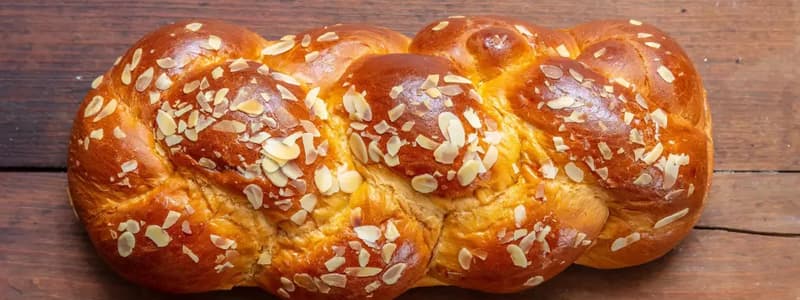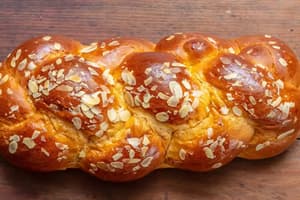Podcast
Questions and Answers
Match the following Greek breads with their corresponding holidays:
Match the following Greek breads with their corresponding holidays:
Tsoureki = Easter Vasilopita = New Year's Day Christopsomo = Christmas Çörek = Turkish holiday
Match the following ingredients with their presence in Tsoureki:
Match the following ingredients with their presence in Tsoureki:
Milk = Yes Sugar = Yes Meat = No Eggs = Yes
Match the following descriptions with the texture of Tsoureki:
Match the following descriptions with the texture of Tsoureki:
Cavelike = Yes Dry = No Moist = No Fluffy = No
Match the following languages with the possible origin of the word 'Tsoureki':
Match the following languages with the possible origin of the word 'Tsoureki':
Match the following traditions with the way people interact with Tsoureki:
Match the following traditions with the way people interact with Tsoureki:
Match the following statements with their relation to Tsoureki:
Match the following statements with their relation to Tsoureki:
The Greek word Tsoureki is of Turkish origin.
The Greek word Tsoureki is of Turkish origin.
Tsoureki is only served at Easter in Greek cuisine.
Tsoureki is only served at Easter in Greek cuisine.
All versions of Tsoureki have identical ingredients.
All versions of Tsoureki have identical ingredients.
The texture of Tsoureki is airy and light.
The texture of Tsoureki is airy and light.
Tsoureki is a traditional bread served only in Greece.
Tsoureki is a traditional bread served only in Greece.
The way people interact with Tsoureki is limited to eating it at the Easter table.
The way people interact with Tsoureki is limited to eating it at the Easter table.
Flashcards are hidden until you start studying




